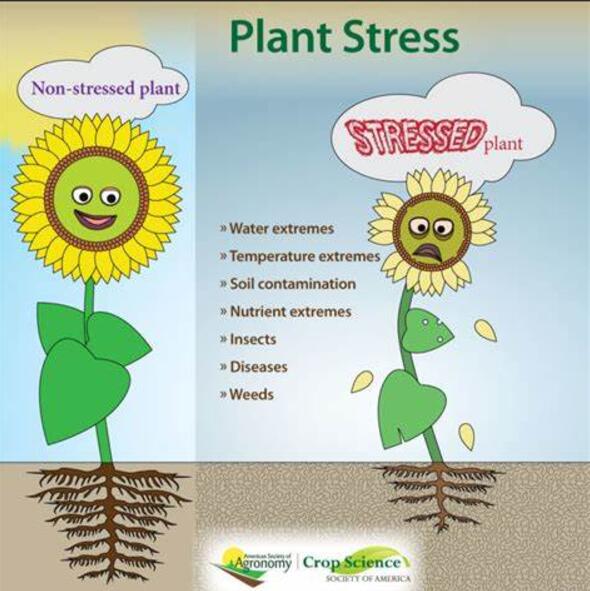低温胁迫下赤霉素对酸枣种子萌发的促进作用
IF 6.8
Q1 PLANT SCIENCES
引用次数: 0
摘要
低温胁迫严重影响酸枣的生长。spinoosa (Bunge) Hu ex H. F. Chow)种子发芽,威胁农业产量。赤霉素A3 (giberellin A3, GA3)虽然能调控酸枣种子萌发,但其在缓解低温胁迫中的作用及其可能的机制尚不清楚。本研究在15℃条件下通过浓度梯度实验确定了提高冷胁迫萌发的最佳GA3浓度(150 mg/L),分析了表型生理指标,并整合了代谢组学和转录组学分析。结果表明,150 mg/L GA3可提高种子发芽率(23%)和活力(18%),提高抗氧化酶活性和脯氨酸水平,减少长时间低温胁迫下的氧化损伤。综合代谢组学和转录组学分析显示,苯丙酸/玉米素生物合成基因(4CL、CCR)表达上调,而CKX和PAL表达下调,这与玉米素含量升高、脱落酸代谢产物减少有关。本研究阐明了ga3介导的酸枣抗寒机制,为低温胁迫下选育抗寒品种和优化酸枣萌发方案提供依据。本文章由计算机程序翻译,如有差异,请以英文原文为准。
Gibberellin-induced germination enhancement in Chinese sour jujube seeds under cold stress
Low temperature stress severely hinders Chinese sour jujube (Ziziphus jujuba Mill. var. spinosa (Bunge) Hu ex H. F. Chow) seed germination, threatening agricultural yields. Although Gibberellin A3 (GA3) regulates seed germination, its role in alleviating low temperature stress and its potential mechanisms in Chinese sour jujube are still unclear. This study determined the optimal GA3 concentration (150 mg/L via concentration gradient experiments under 15 °C) to improve germination under cold stress, analyzing phenotypes physiological indices, and integrating metabolomics and transcriptomics analysis. Results showed 150 mg/L GA3 increased germination rate (23 %) and vigor (18 %), enhancing antioxidant enzyme activities and proline levels to reduce oxidative damage during prolonged cold exposure. Comprehensive metabolomics and transcriptomics analysis showed that phenylpropionic acid/zeatin biosynthesis gene (4CL, CCR) was up-regulated, while CKX and PAL were down-regulated, which were related to the increase of zeatin and the decrease of abscisic acid metabolites. This study clarified the GA3-mediated cold-resistant mechanisms of Chinese sour jujube, which provided a basis for breeding cold-resistant varieties and optimizing germination scheme under low temperature stress.
求助全文
通过发布文献求助,成功后即可免费获取论文全文。
去求助
来源期刊

Plant Stress
PLANT SCIENCES-
CiteScore
5.20
自引率
8.00%
发文量
76
审稿时长
63 days
期刊介绍:
The journal Plant Stress deals with plant (or other photoautotrophs, such as algae, cyanobacteria and lichens) responses to abiotic and biotic stress factors that can result in limited growth and productivity. Such responses can be analyzed and described at a physiological, biochemical and molecular level. Experimental approaches/technologies aiming to improve growth and productivity with a potential for downstream validation under stress conditions will also be considered. Both fundamental and applied research manuscripts are welcome, provided that clear mechanistic hypotheses are made and descriptive approaches are avoided. In addition, high-quality review articles will also be considered, provided they follow a critical approach and stimulate thought for future research avenues.
Plant Stress welcomes high-quality manuscripts related (but not limited) to interactions between plants and:
Lack of water (drought) and excess (flooding),
Salinity stress,
Elevated temperature and/or low temperature (chilling and freezing),
Hypoxia and/or anoxia,
Mineral nutrient excess and/or deficiency,
Heavy metals and/or metalloids,
Plant priming (chemical, biological, physiological, nanomaterial, biostimulant) approaches for improved stress protection,
Viral, phytoplasma, bacterial and fungal plant-pathogen interactions.
The journal welcomes basic and applied research articles, as well as review articles and short communications. All submitted manuscripts will be subject to a thorough peer-reviewing process.
 求助内容:
求助内容: 应助结果提醒方式:
应助结果提醒方式:


